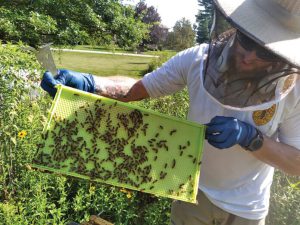The vital role of county apiary inspectors in safeguarding bee health
By Eric Hange

Medina County Apiary Inspector Michael Mohn evaluates a local hive. (Submitted photo)
In the delicate balance of ecosystems, pollinators play a crucial role in ensuring the reproduction of flowering plants and the sustainability of agriculture. Among these essential pollinators, bees stand out as indispensable contributors to the global food supply. However, the health of bee colonies is under constant threat from contagious diseases and pests. In this critical scenario, County Apiary Inspectors play a pivotal role in monitoring and preserving the well-being of bee colonies.
Before delving into the significance of County Apiary Inspectors, it’s crucial to understand why bees are so vital to our ecosystem. Bees are responsible for pollinating a substantial portion of the world’s crops. Their pollination services contribute not only to the abundance of our food supply but also to the biodiversity of ecosystems. In fact, it’s estimated that one-third of the global food supply depends on pollinators.
Despite their importance, bee populations worldwide face threats, ranging from habitat loss, contagious diseases and invasive pests that can decimate entire colonies. Diseases like American Foulbrood and pests such as the Varroa mite pose serious risks to bee health, leading to colony collapse, disorder and consequences for agriculture.
County Apiary Inspectors serve as the frontline defense against the spread of bee diseases and pests. These dedicated professionals are trained to identify, monitor and manage the health of bee colonies within their jurisdiction. Their responsibilities encompass regular inspections of apiaries, monitoring bee behavior and implementing preventive measures to ensure the well-being of bee populations.
1. Early detection and prevention: Apiary inspectors are equipped with the knowledge and tools to detect the early signs of contagious diseases and pest infestations. Early detection is crucial in preventing the rapid spread of diseases that can wipe out entire bee colonies. By regularly inspecting hives, these inspectors can intervene promptly, implementing measures to contain and manage potential threats.
2. Education and outreach: County Apiary Inspectors also play a vital role in educating beekeepers and the community about best practices for beekeeping, disease prevention and pest management. Their outreach efforts contribute to building a community of informed beekeepers who can actively participate in safeguarding the health of their colonies.
3. Regulatory compliance: Apiary inspectors ensure that beekeepers comply with relevant regulations and guidelines related to beekeeping. This includes implementing measures to control the spread of diseases and pests, such as quarantine protocols and treatment recommendations.
4. Data collection and research: By systematically collecting data on bee health, inspectors contribute valuable information to research initiatives aimed at understanding and mitigating the factors affecting bee populations. This data-driven approach enhances our ability to develop effective strategies for bee conservation.
In the face of mounting challenges to bee health, County Apiary Inspectors emerge as indispensable guardians of these vital pollinators. Their vigilant monitoring, early intervention and educational efforts contribute to the resilience of bee colonies and, consequently, the sustainability of our food supply. As we acknowledge the pivotal role of these inspectors, it becomes imperative to support their endeavors through increased resources, training and public awareness. By doing so, we invest in the preservation of our bees.
Reprinted with permission. We are here to share current happenings in the bee industry. Bee Culture gathers and shares articles published by outside sources. For more information about this specific article, please visit the original publish source: https://www.farmanddairy.com/columns/the-vital-role-of-county-apiary-inspectors-in-safeguarding-bee-health/807902.html






